Motorola ThinkPhone review: It’s worth thinking about

Lenovo ThinkPhone by Motorola
The Motorola ThinkPhone is sleek, powerful, and stable. The Google Pixel 7 will be a better purchase for most people, especially if you value great photos, but enterprise customers looking for excellent reliability should keep this one in mind.
Lenovo has been the steward of the iconic ThinkPad brand for almost 20 years, and the Motorola division it picked up in 2014 has its own historic importance as the inventor of the cell phone. Combine those two brands, and you have the ThinkPhone. It’s every bit a modern smartphone on the inside, but it’s got a refreshing ThinkPad vibe on the outside. Motorola is aiming this device at enterprise, but even the average smartphone user should take note of the ThinkPhone — it’s one of the best phones from Motorola since the company became part of Lenovo. Find out more in Android Authority’s Motorola ThinkPhone review.
About the Motorola ThinkPhone review: I tested the ThinkPhone over a period of two weeks. It was running Android 13 on the April 2023 security patch. The unit was provided by Motorola for this review.
Motorola ThinkPhone review: What you need to know
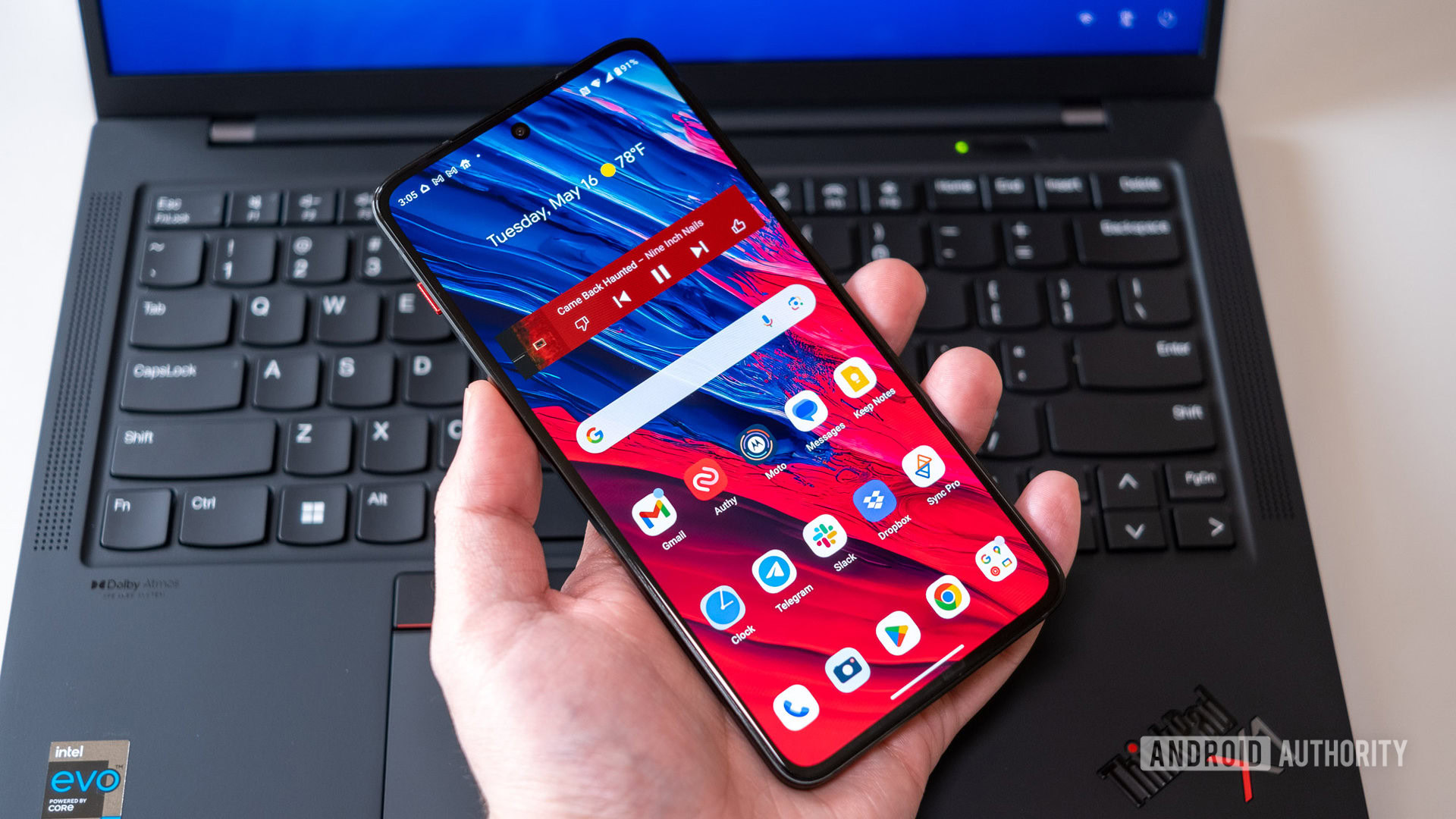
Ryan Whitwam / Android Authority
- Motorola ThinkPhone: $699.99
The best way to describe the ThinkPhone’s vibe is “mature.” It does not try to impress with a visually interesting but ultimately awkward design like the company’s Motorola Edge phones. The ThinkPhone only comes in the Volcanic Gray colorway, but instead of the customary glass rear panel, the ThinkPhone changes it up with a gray Aramid fiber back. That’s the same material Lenovo uses on ThinkPads.
Despite the different look and the awkward official “Lenovo ThinkPhone by Motorola” moniker, this is still a Motorola phone. The version of Android 13 has some minor modifications to the interface and settings, but it’s much less heavy-handed than Samsung or even Google these days. Motorola is pushing its ReadyFor capabilities as a boon for business customers. This software lets the phone link with your Windows PC for file sharing, app streaming, and notification management. You can even use the ThinkPhone as a high-quality webcam with ReadyFor. This feature works on all Windows 10 and 11 machines, but you’ll need to get the ReadFor app from the Microsoft Store.
The ThinkPhone is a mature-looking device that’s priced slightly lower than Motorola’s mainline flagship phones.
Moto also emphasizes its ThinkShield security suite, which is enabled by default on the ThinkPhone. The system claims to prevent malware and phishing attacks, while also hardening the system against data theft. However, Motorola is coy about providing details or comparing ThinkShield to the security features of other Android phones. The same features are active on the company’s non-Think-branded phones, too.
The ThinkPhone is priced slightly lower than Motorola’s mainline flagship phones, but it’s not built on a budget phone platform. It has a Qualcomm chipset; Snapdragon 8 Plus Gen 1 instead of the newer Gen 2. There’s also 8GB or 12GB of RAM and 256GB of storage. There’s no microSD card slot, and Motorola doesn’t offer additional SKUs with more space.
We’re starting to see phones launch with Wi-Fi 7 support, but the ThinkPhone tops out at Wi-Fi 6E. Likewise, it doesn’t have the fastest millimeter wave 5G. Those networks have very limited coverage and require additional antennas, so plenty of non-carrier phones skip it. Yes, the ThinkPhone doesn’t have a carrier partner to push it, which is unusual for Motorola.
You can pick up the ThinkPhone from Motorola for $699.99. Business customers can also get the phone through enterprise channels. It will be supported with software updates for up to three years and will receive security patches for four years.
What I like about the Motorola ThinkPhone
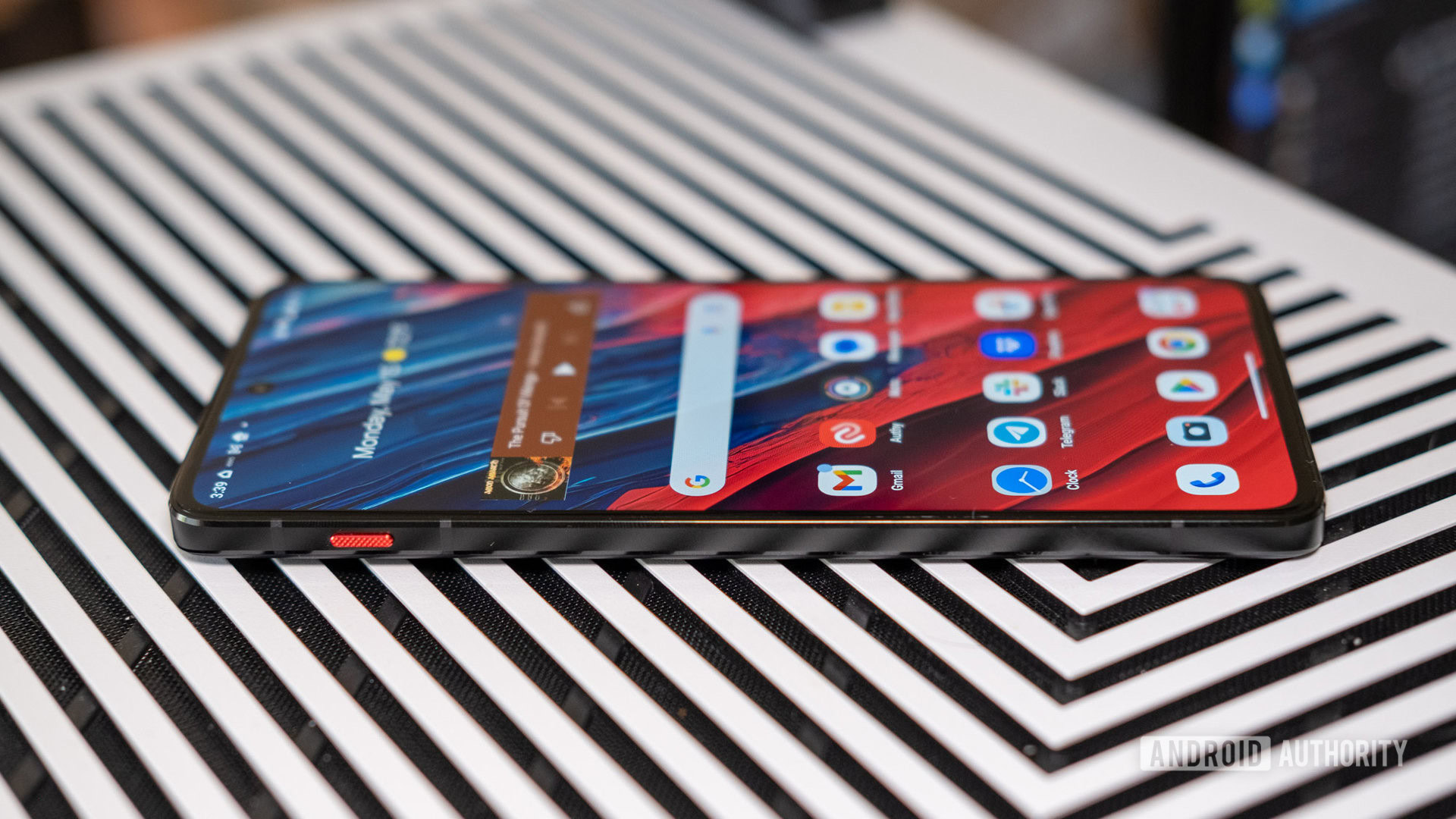
Ryan Whitwam / Android Authority
Motorola has released some of the slipperiest phones in history with its Edge series, but the ThinkPhone is a joy to hold. The Aramid fiber back is soft and grippy, but it won’t absorb skin oils. Aramid is a durable material that resists scuffing and cutting, and best of all, it won’t shatter when dropped like a glass panel. There’s no 3.5mm headphone jack, but the stereo speakers (earpiece and down-firing) are perfectly serviceable.
There’s still plenty of glass on the front that could break if you drop the ThinkPhone. Under the Gorilla Glass Victus panel is a large 6.6-inch OLED, clocking in at 2,400 x 1,080 with a 144Hz refresh rate. It looks sharp, vibrant, and has perfect viewing angles. You can tell it’s only 1080p if you’ve got a 1440p or 4K screen to compare side-by-side, but I was never too fussed about the resolution considering the overall quality. Outdoor brightness is no problem, either, and it gets suitably dim in a dark room. However, the low-brightness contrast takes a hit compared to Samsung phones.
The ThinkPhone is a joy to hold
The ThinkPhone has a flat OLED, as opposed to the curved OLEDs Motorola continues to use on its Edge flagship phones. That means fewer accidental touches while holding the phone, and it’s feasible to reach most of the display on the ThinkPhone due to the narrow bezels — they’re also close to symmetrical all the way around.
Beneath the display is an optical fingerprint reader. It will light up a dark room like all other phones using this kind of sensor, but we found the ThinkPhone’s to be very fast and reliable. If you place a finger over the optical sensor while picking the phone up, the phone will probably be unlocked before you’ve even raised it all the way.
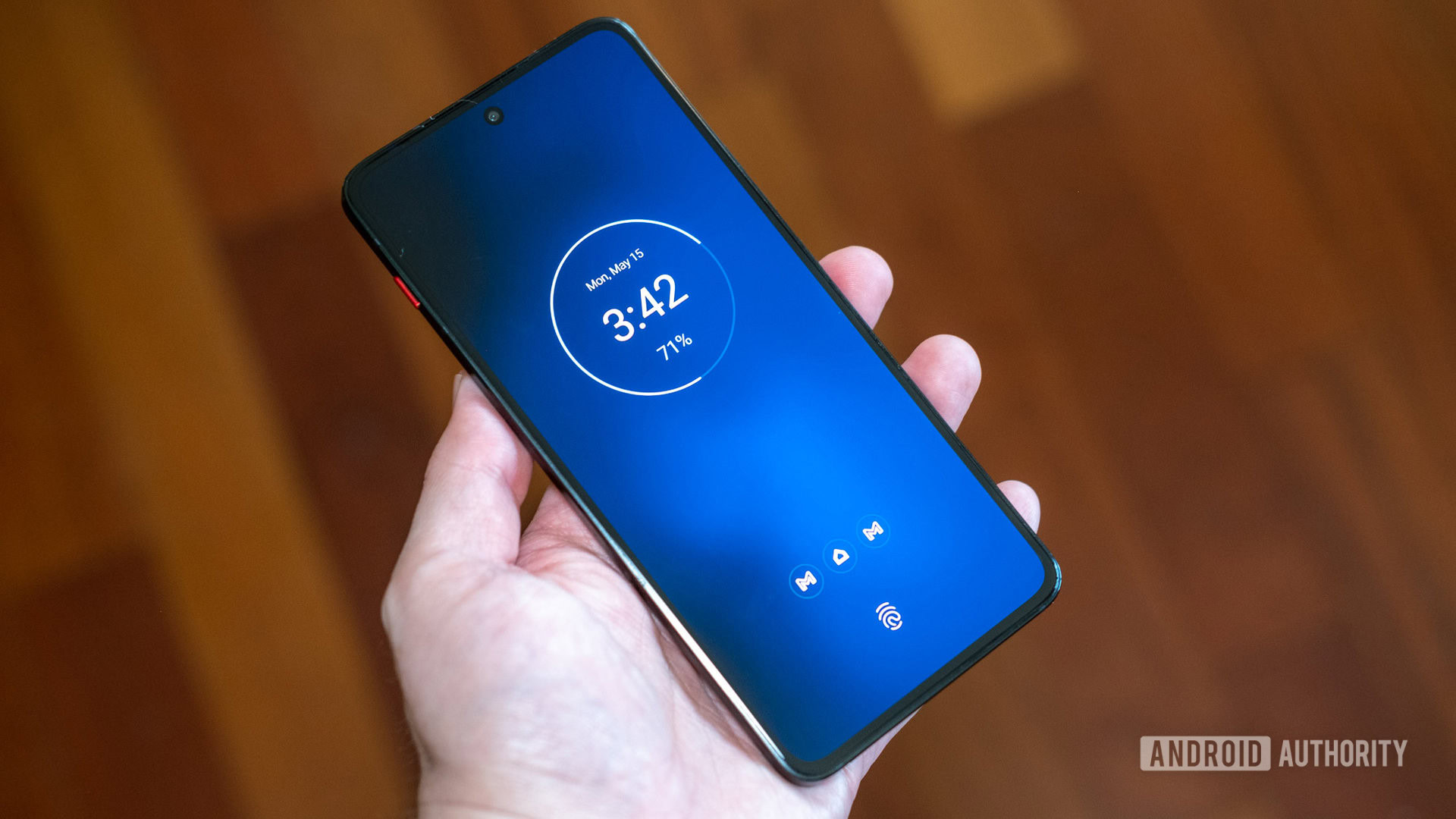
Ryan Whitwam / Android Authority
The fingerprint sensor is a bit lower than we’d prefer, but it leaves room for Motorola’s Peek Display. This feature has existed since the first Moto X a decade ago, but it’s still fantastic. Instead of waking up your phone and looking at notifications, you can lift or tap the screen to get the Peek interface. It shows you the current notifications with the option to expand, open, or dismiss them with a quick swipe gesture. Motorola’s build of Android 13 includes other handy features, most of which are almost as old as Peek Display. I got a lot of mileage out of the quick flashlight gesture — a quick chop-chop motion turns it on and off. I also appreciate that Motorola supports Material You colors in Android 13 for some nice UI customization options.
In keeping with the ThinkPad style, there’s a bright red side key near the top of the phone. You can configure this button to launch any app or shortcut with a single press, but double-press is dedicated to turning ReadyFor on or off. The key isn’t in the most convenient place, but it adds a fun pop of color, and we’re not going to argue about easier access to important features.
The ThinkPhone is super-reliable. The only time it needed a restart in more than two weeks of testing was after an OTA update.
The ThinkPhone is a rock-solid device, due perhaps to its focus on enterprise and the use of an older chipset. It’s more than fast enough for all your general smartphone tasks, and despite its business-ready exterior, it can run all the latest games with aplomb. I didn’t encounter any serious bugs, app slowdowns, or crashes. The only time the phone needed a restart in more than two weeks of testing was after an OTA update.
The ThinkPhone has a typical 5,000mAh battery, but the battery life is unusually strong. The phone will easily last two days, even with heavier usage. It should manage eight to nine hours of screen time in a single day if you run it especially hard, but it’ll recharge fast thanks to the bundled 68W charger. So few phones come with plugs anymore that it’s refreshing when one appears, and this one is very fast. You can get completely recharged in less than an hour, and I had good luck hitting the advertised speeds with third-party USB Power Delivery plugs.
What I don’t like about the Motorola ThinkPhone
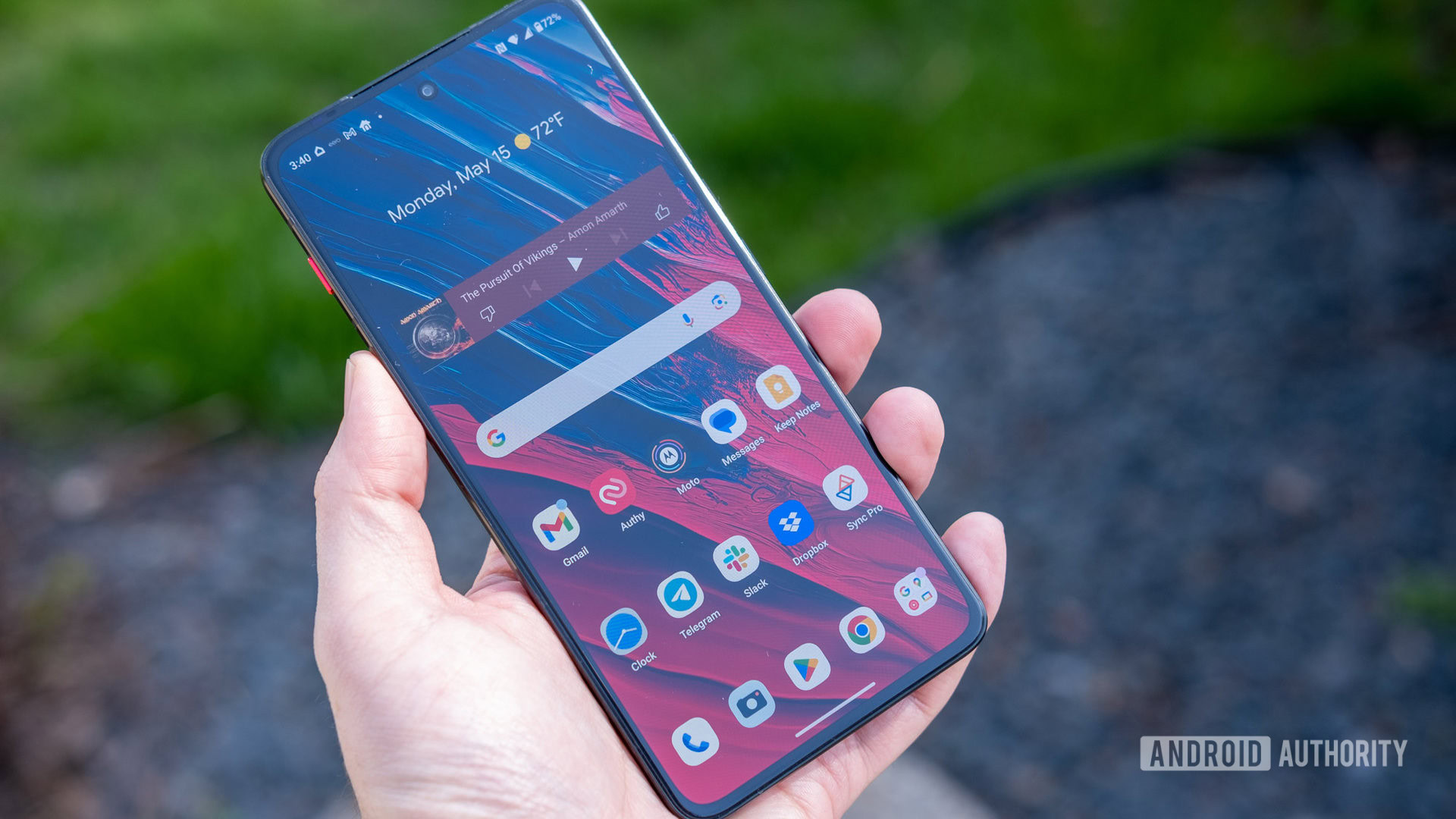
Ryan Whitwam / Android Authority
We’ll get into the middling camera performance later, but the imaging hardware hints at what’s in store. You get a 50MP primary with a 13MP ultrawide. Those are the only useful cameras, but there are three back there. The ThinkPhone also has a 2MP depth camera when most phones get by without one. We usually see these basic third sensors when OEMs just want to have three lenses on the back to make a phone look more expensive.
Most of ReadyFor’s features are replicated in the Microsoft Phone Link app, which works on all Android smartphones.
Motorola is aiming to make ReadyFor a core part of its smartphone experience, and there are some useful features under this umbrella. I appreciated being able to send files and clipboard contents between a PC and the phone, and notifications worked very well. However, most of ReadyFor’s features are replicated in the Microsoft Phone Link app, which works on all Android smartphones. So, ReadyFor isn’t much of a differentiator. I also had trouble getting the ReadyFor client installed on one of my test machines (the Store just gives a generic error message).
Perhaps the biggest problem for the ThinkPhone is price. It’s not objectively overpriced — $699 is fair for the specs, features, and software you get. However, Motorola wasn’t able to match the Pixel 7‘s price of $600, and that makes the Moto a tough sell. The ThinkPhone does have some advantages, like the 144Hz screen and 68W charging, but the Pixel has better software, faster updates and longer support, and a much better camera.
Motorola ThinkPhone camera review
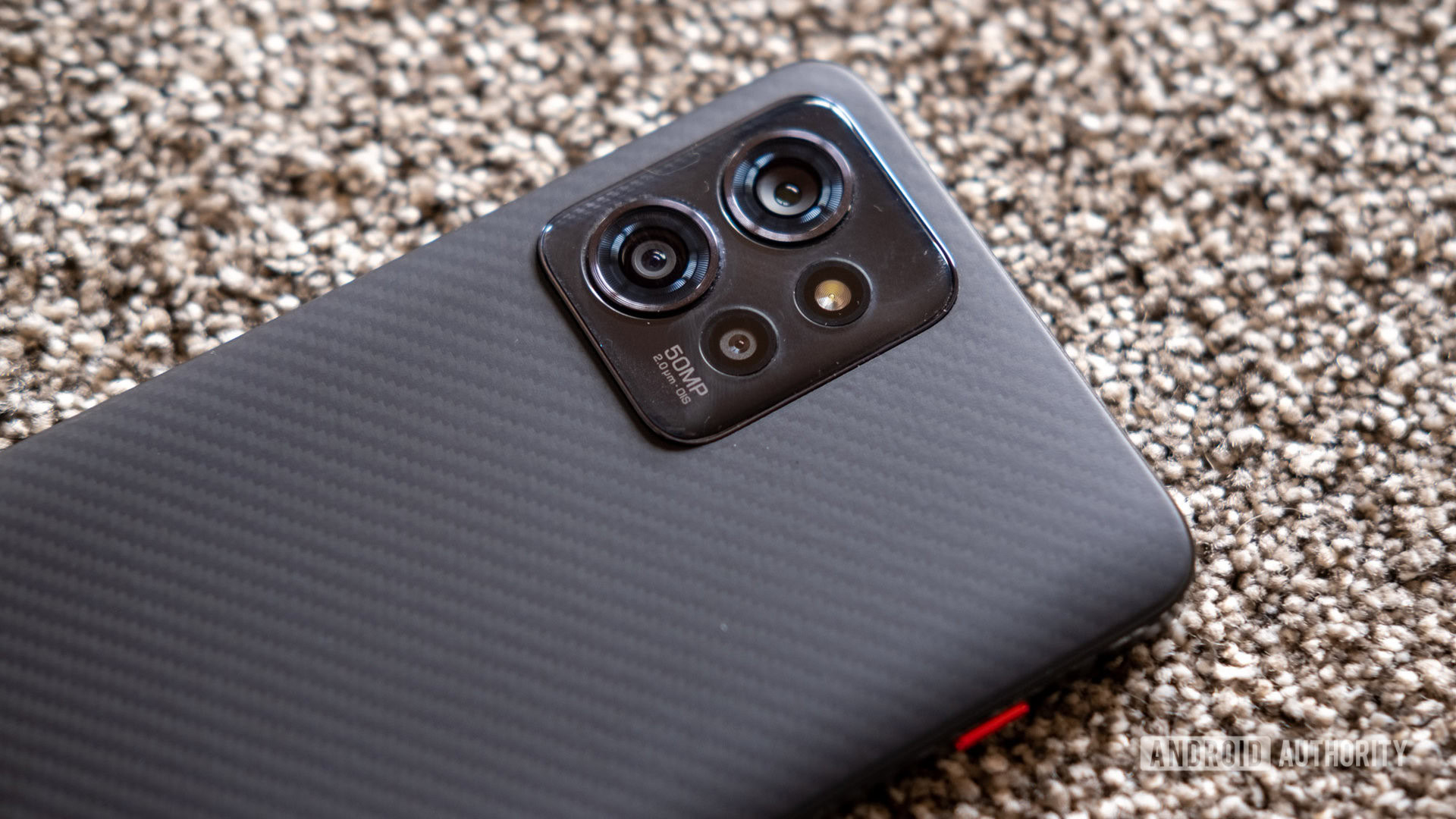
Ryan Whitwam / Android Authority
Motorola says the ThinkPhone has a completely redesigned camera phone experience, but if you’re hoping for a big jump in quality, think again. The 50MP primary camera can take some decently detailed photos (binned to 12.5MP), provided you have ample light. We were happy with most of the shots we took outside, and even those in bright indoor lighting looked good overall.
Dynamic range is a problem for the ThinkPhone. While a similarly priced Pixel or Samsung Galaxy S can bring out detail in light and dark areas to an almost supernatural degree, the ThinkPhone’s photos usually look much “flatter.” Exposure times also skyrocket indoors, making it difficult to capture moving subjects. The ISO goes pretty high (over ISO 1000) in most indoor shots, too, but the phone does manage to keep noise to a minimum.
The 13MP ultrawide camera does its job, with a wide 120-degree field of view, good colors, and very little edge distortion. We applaud Motorola for adding autofocus to the ultrawide camera, which makes it suitable for macro shots. These turn out surprisingly well compared to images shot with dedicated macro cameras, which are often tacked onto budget phones for no reason other than to increase the number of cameras.
That’s not to say there are no throwaway sensors — this device sports a 2MP depth sensor next to the primary and ultrawide cameras. This module is supposed to aid in portrait mode photos, but a phone in this price range shouldn’t need a dedicated sensor for that. Regardless, the portrait mode shots aren’t anything to write home about. The Pixel, which doesn’t have a depth sensor, produces better results.
Video tops out at 4K and 30fps, and the story is much the same as still photos. Video recording is competent, but it’s not going to wow anyone, especially at such a choppy frame rate. In good light, you will get passable clarity and somewhat muted colors, but you’d expect to see 4K/60fps at this price as standard.
Motorola ThinkPhone specs
| Lenovo ThinkPhone by Motorola | |
|---|---|
|
Display |
6.6-inch pOLED |
|
Processor |
Qualcomm Snapdragon 8 Plus Gen 1 |
|
RAM |
8GB |
|
Storage |
256GB |
|
Power |
5,000mAh battery |
|
Cameras |
Rear:
– 50MP wide, 1/1.5-inch sensor, OIS, f/1.8 – 13MP ultrawide, 1/2-inch sensor size, f/2.0 Selfie: |
|
Audio |
Dual speakers |
|
SIM |
NA: single SIM |
|
Durability |
Aramid fiber back panel |
|
Biometrics |
In-display fingerprint reader |
|
Software |
Android 13 |
|
Dimensions and weight |
158.7 x 74.4 x 8.2mm
188.5 grams |
|
Colors |
Volcanic Gray |
Should you buy the Motorola ThinkPhone?
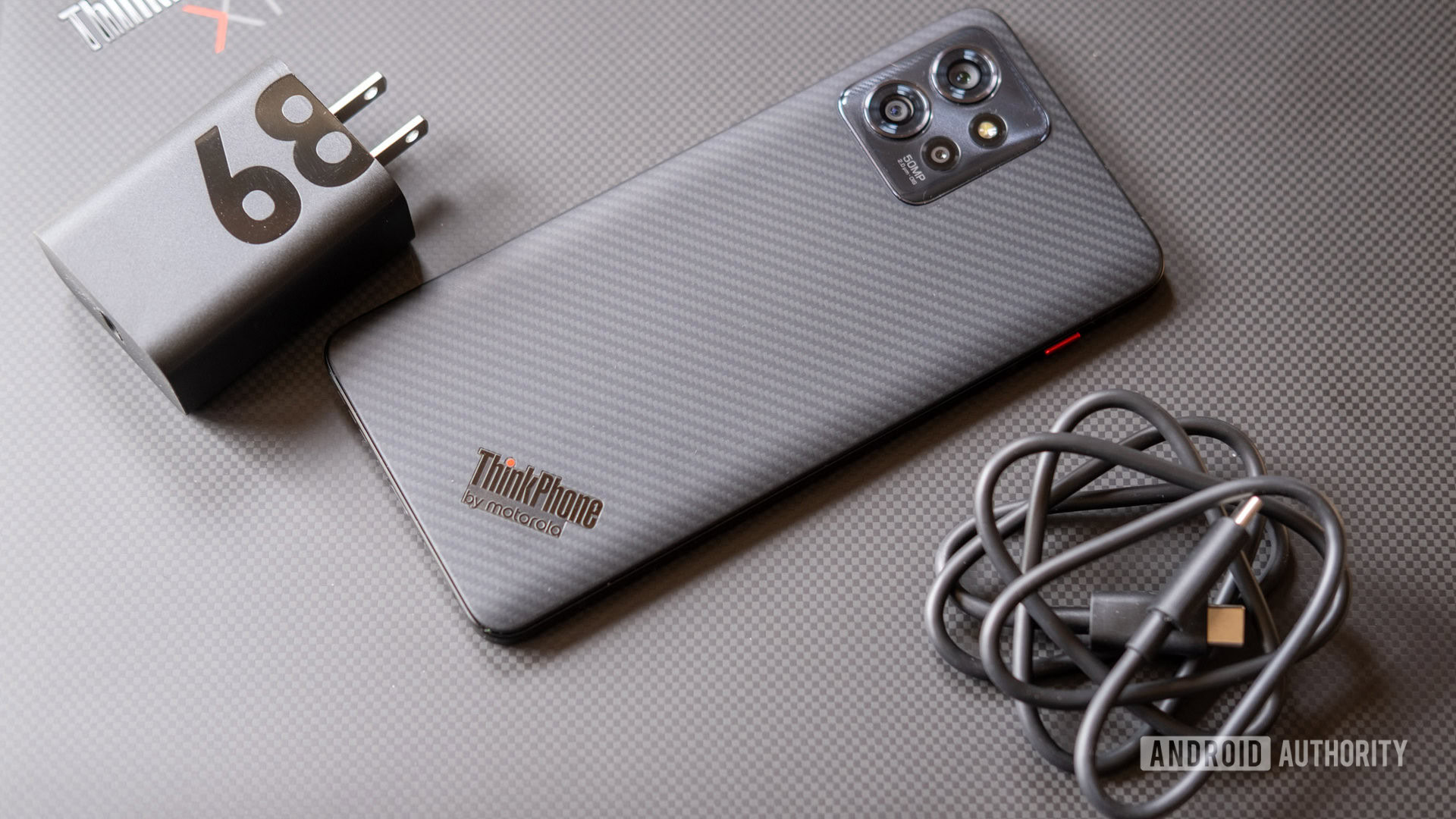
Ryan Whitwam / Android Authority
The evolution of flagship smartphones has converged on a proven formula: a metal frame, a big glass panel on the back with a few camera cutouts, and a big glass screen on the other. There’s nothing wrong with this, but it can be a little yawn-inducing. The Motorola ThinkPhone has a different vibe thanks to its ThinkPad roots. Add to that tremendously stable software and useful Windows integrations, and you have a phone that largely lives up to the proud tradition of the ThinkPad.
While it’s not fully ruggedized, Motorola touts MIL-STD-810H compliance. There’s no established standard for that term, so it’s up to companies to test as they see fit. That said, the ThinkPhone has held up well, with no visible damage to the Aramid fiber back. The screen and aluminum frame are also flawless. There’s also IP68 certification, which does have firm testing standards: the ThinkPhone will survive 30 minutes under 1.5m of water without drowning.
The Lenovo ThinkPhone by Motorola lives up to the proud tradition of the ThinkPad and is a great buy for enterprise customers looking for smart looks and reliability.
It’s common for brand-new smartphones to have a glitch here and there — an app might not work right, the system UI can bug out, or things just get laggy for no reason. It’s not the end of the world, as a quick reset will fix most issues. That was unnecessary with the ThinkPhone, which was rock solid the entire time I tested it. In fact, as I sat down to work on this review, I realized I hadn’t had to restart the phone at all the entire time I was testing it (more than 300 hours of uptime). Enterprise customers value reliability, but that kind of stable experience is good for anyone who runs their life from a smartphone.
For an enterprise customer, mediocre cameras won’t be a problem, either. They’re more than good enough for casual use, but you rarely get a truly memorable photo from this device. For average smartphone users who want to be able to snap great pics, the ThinkPhone will be a disappointment.
In fact, perhaps the worst thing about the ThinkPhone isn’t a problem with the phone itself; it’s what this phone is not. It’s not the Google Pixel 7 ($599 at Amazon), which is $100 less at MSRP. While the ThinkPhone might have a pleasantly understated design and great battery life, Google has Moto beat when it comes to software support and camera performance.


Lenovo ThinkPhone by Motorola
Attractive, durable ThinkPad-style design • Excellent battery life • Clean, fast Android build
Worth thinking about.
The Lenovo ThinkPhone by Motorola lives up to the proud tradition of the ThinkPad and is a great buy for enterprise customers looking for smart looks and reliability.
Motorola ThinkPhone review: FAQs
Nope, Motorola will sell the unlocked ThinkPhone to anyone with $699.99
No, ReadyFor and “Think 2 Think” features are supported on all Windows 10 and 11 computers.
The US version of this phone only supports a single nano-SIM, but there is a dual-SIM international version.
The ThinkPhone is an unlocked 5G phone and will work on any major US network, but it lacks mmWave 5G.
For all the latest Technology News Click Here
For the latest news and updates, follow us on Google News.

